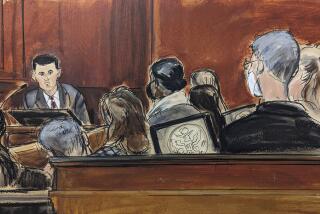Greenspan defends Fed’s handling of subprime mortgage market
- Share via
Reporting from Washington — The federal commission probing the financial crisis took aim at the causes of the subprime mortgage meltdown, but former Federal Reserve Chairman Alan Greenspan said Wednesday that it shouldn’t point at him.
Summoned to address sharp criticism that the Fed failed to stop the housing bubble and the risky mortgages that helped pop it, Greenspan strongly defended his actions and warned that regulators alone couldn’t stop financial crises.
The best prevention, he said, would come from increasing requirements on banks and other financial institutions to have more money and collateral to carry them through rough times.
Greenspan, whose reputation as a financial sage has soured since the market meltdown, fought back against tough questioning by some members of the Financial Crisis Inquiry Commission as it began three days of hearings on subprime mortgages.
He admitted mistakes in his 18-year tenure as chairman, which ended in 2006. But he denied that his strong free-market ideology led him to neglect the Fed’s responsibility for regulating some of the nation’s largest banks and for writing rules to protect consumers from unscrupulous lenders.
“I don’t have the discretion to use my own ideology to affect my judgments as to what the Congress is requiring the Federal Reserve and others to do,” Greenspan said during 2 1/2 hours of sometimes combative testimony that ended amid a brief power failure in the hearing room.
“I ran my office as required by law, and there’s an awful lot of laws that I would not have constructed in the way they were constructed. But I enforced them nevertheless because that was my job,” he said.
Commission member Brooksley Born said that under Greenspan, the Fed “utterly failed to prevent the financial crisis.”
Born, a Democratic appointee and former head of the Commodity Futures Trading Commission, hammered Greenspan for endorsing the deregulation of complex financial derivatives, such as credit default swaps, that helped cause the crisis and the near-collapse of insurance giant American International Group Inc.
“Are you aware that the collapse of AIG was caused by its commitments under credit default swaps that it had issued?” Born asked Greenspan. “The taxpayer has had to bail out AIG because of its exposure on credit default swaps to the tune of more than $180 billion.”
Greenspan responded that credit default swaps -- insurance against investment losses -- were a small part of the derivatives market when be backed deregulation.
The Fed has faced the most heat for its handling of subprime mortgages. Critics have hammered the central bank for taking 14 years, until 2008, to enact rules to protect consumers from predatory lenders after Congress gave it the authority.
Testifying for only the second time on Capitol Hill since the financial crisis began, Greenspan said the Fed closely monitored the subprime market, which grew from a “small but successful appendage” of real estate lending in the 1990s to a major force in driving up housing prices in the last decade.
The Fed took steps to address the problem, beginning in 1999, by issuing guidance to lenders and banks. Still, Greenspan did not believe that all subprime mortgages, or any category of loan, should be banned as “unfair” or “abusive.”
He said the selling of the soaring number of subprime mortgages in securities to investors was the trigger for the financial crisis. He blamed affordable housing mandates set by federal officials on Fannie Mae and Freddie Mac, and their subsequent large-scale purchase of securities backed by subprime mortgages, for the run-up in the housing market and the subsequent bust.
But Phil Angelides, the commission’s chairman, didn’t buy Greenspan’s explanation. Angelides noted problems with Fannie and Freddie, which were seized by the federal government in 2008 in the face of huge losses on subprime mortgage securities. But the Fed still failed to write tough rules for those mortgages during Greenspan’s tenure as chairman, he said.
“You did have the ability to regulate the products coming into the marketplace. I do want to make sure we’re not rewriting or forgetting history here,” said Angelides, a Democratic appointee and former California state treasurer. “You could have, you should have, and you didn’t.”
Asked by Angelides whether he would put the failure to enact tough subprime mortgage rules “under the category of ‘Oops, we should have done it,’ ” Greenspan said it was impossible to be right all the time.
“I was right 70% of the time, but I was wrong 30% of the time, and there were an awful lot of mistakes in 21 years,” Greenspan said.
“Would you put this in the 30% category?” Angelides asked.
Greenspan responded, “I don’t know; certainly part of it I would.”
But he also said that had the Fed acted to rein in subprime lending before the housing bubble burst -- when foreclosures and delinquencies weren’t rising significantly -- there would have been a backlash by members of Congress eager to see an increase in U.S. homeownership.
“Had we said [then] we’re running into a bubble and we have to start to retrench, the Congress would [have said], ‘We haven’t a clue what you are talking about,’ ” Greenspan said. He said Congress “would have clamped down on us” and he accused current critics of the Fed’s policies of having “amnesia.”
Commission Vice Chairman Bill Thomas, a Republican, went easier on Greenspan. “There are an enormous number of ‘woulda, coulda, shoulda’ from an enormous number of institutions in government and the private sector,” Thomas said of the financial crisis.
jim.puzzanghera@
latimes.com
More to Read
Inside the business of entertainment
The Wide Shot brings you news, analysis and insights on everything from streaming wars to production — and what it all means for the future.
You may occasionally receive promotional content from the Los Angeles Times.











